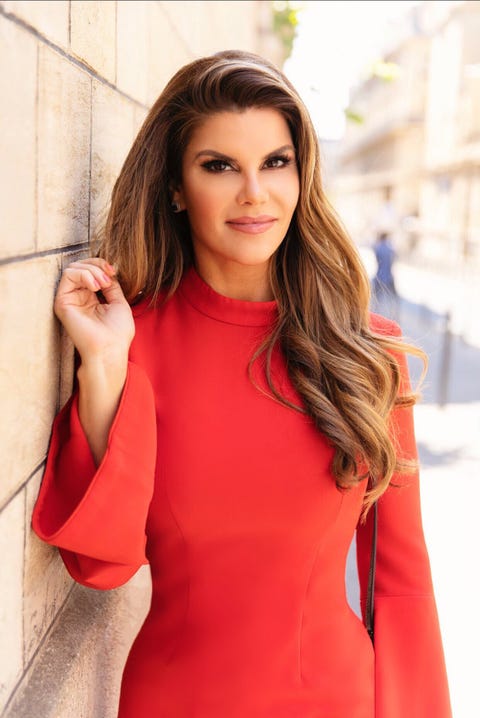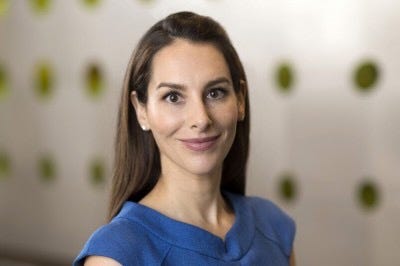If, like me, you’ve been obsessively watching CNN while working from home during the pandemic, you might be familiar with Dr. Seema Yasmin among mainstays like Dr. Anthony Fauci and Dr.
Sanjay Gupta. Like Fauci, Yasmin is a physician and an epidemiologist, and like Gupta, she is a medical journalist. She is also a clinical assistant professor at the Stanford University School of Medicine, director of the Stanford Health Communication Initiative, and she has published two books. Yet when Yasmin goes on TV, it’s not her credentials that get attention. “I get constant comments telling me that my lipstick is too shiny, my eyebrows look like they’re darker than they should be, and that I wear too much makeup,” she says. “Recently, I was told that I dress like a teenager.”
The focus on Yasmin’s looks has been apparent to her for years. “It started in 2014 soon after I began working as a broadcast journalist,” she explains. “I received many messages from people who didn’t comment on the content of what I was sharing, but instead called out my appearance: my face, my hair, what I was wearing. It happened a lot when I covered the Ebola crisis on CNN and other networks, and when I did a weekly segment on a local NBC station in Dallas.”
During COVID, she has been hosting a weekly Instagram Live where she gives vital updates and interviews medical experts from around the world. The feedback ranges from sexism disguised as compliments: “You’re too pretty to be a doctor,” to blatant criticism: “Why do you always look like you’re going to a party?” Such commenters often also question her credibility: “Are you even a doctor?” As she says, all people have to do is google her to find her credentials. “It’s tiring,” Yasmin adds. “And it’s disturbing because I’m discussing a pandemic where people are literally trying not to die.”

If that’s not enough, the chides can turn childish, even nonsensical. “I would take you more seriously if you didn’t have plastic surgery.” Yasmin has never had plastic surgery. “The thing is, I should be able to have plastic surgery,” she says. Doing so, “shouldn’t take away from the content of what I’m sharing, which is my experience as a physician, a scientist, an epidemiologist, and a journalist.”
It’s misogyny plain and simple, she says: “If you’re considered attractive, it’s as if your intellect is diminished. I’ve had patients ask me if I went to medical school or beauty school. It all comes down to this disbelief that a woman can be all things. A woman can’t be educated and fashionable; she can’t be both professional and wear makeup.”
Yasmin’s frustration is symptomatic of the bias that if you are a scientist or a doctor who also happens to be a woman, you must not appear too attractive to be taken—and treated—seriously. This brand of sexism, from colleagues and patients alike, has plagued medicine for years, but recently an article published in the Journal of Vascular Surgery rubbed salt in the wounds of many women in the field.
"It's tiring and disturbing because I’m discussing a pandemic where people are literally trying not to die."
The paper, which appears in the August 2020 issue of the journal published by Boston University Medical Center, was written by a group of male vascular surgeons who surveilled the social media accounts of young female vascular surgeons. Their “findings”? They labeled women—who did not give their permission to be studied—as unprofessional if they had posted photos of themselves in bikinis or in “provocative” Halloween costumes. “It went beyond appearance and even deemed doctors who advocated for gun control and for LGBTQ rights as unprofessional,” Yasmin adds. “Really, it was their own particular definition of what was considered ‘unprofessional,’ and somehow it got published.”
Reaction to the study has been nothing short of viral. Women doctors around the world shared photos of themselves in swimsuits using the hashtag #MedBikini, in open revolt of the journal’s sexist and restrictive view on what it means to be professional. One doctor who posted a #MedBikini photo is New York City-based dermatologist Dr. Dendy Engelman, who says she experienced sexism beginning in her residency when she was told she was “too pretty” to be a doctor by a senior physician. “I was pulled aside and told that my outfits were too provocative and was instructed to wear scrubs when everyone else got to wear normal clothes,” Engelman says. She was also told to cut her hair short in order to “look the part.”
She has heard similar stories from friends in the field. “A colleague of mine who worked at a prestigious NYC hospital was told to wipe off her lipstick before making rounds with her team,” Engelman says. “Another was reprimanded for showing too much skin in her headshot when only her forearms were exposed.”

That colleague—NYC oncologist and breast cancer specialist, Dr. Elizabeth Comen—says she has spent many sleepless nights internalizing criticism about how she should look as a doctor. “I’ve had professional pictures of me dissected by senior male physicians, judging whether I looked ‘too attractive’ or ‘too glamorous,’” she says. Comen, a Harvard Medical School graduate, says the most painful memory is from September 2014 when, as an attending physician, she was admonished by a senior male colleague who told her touching her uncovered forearm in a professional photo was “too sexy.”
“I was told that I needed to understand how men in positions of power would perceive my looks,” Comen says of the incident. “I deeply respected and wanted to work with these men. And I think in their minds they thought they were trying to protect me from a larger sexist system, without realizing that they were actually perpetuating it.” She decided to push back, albeit with trepidation. “I knew that it wasn’t my job to teach these men how to react to my looks,” Comen adds.
A 2017 study by the University of Cambridge found women who are seen as attractive are also seen as less likely to produce quality science.
Even though she spoke up, nothing was really resolved, she says. “It was more of a ‘Yes, of course...’ after which the senior physician proceeded to tell me how I should and shouldn’t look in a picture.” The experience stuck with Comen. “I questioned my ability to be a surgeon,” she says. “I was always worried that if I looked or acted too feminine that I wouldn’t be taken seriously as a scientist,” Comen points me to a 2017 study by the University of Cambridge that found women who are seen as attractive are also seen as less likely to produce quality science.
And, of course, not all of the upbraiding comes from men. Not long ago, Comen appeared as a medical expert for an advertisement. When a female colleague saw the piece, her feedback was less than flattering: “You just don’t look like a doctor; you look like you belong in Hollywood. Why is your hair down? Why are you wearing makeup? You are just too much.”

Yasmin has experienced that too. “I’ve definitely had incidents where I’ve been treated a particular way by women colleagues because of how I look, or when I’ve looked to them for support, the advice is often ‘Well, you should change the way you dress,’” she says. “Women are some of the best upholders of patriarchy. They can be very adept at policing and holding other women to a particular standard of appearance and behavior.”
There are signs that standard might be changing. The internet’s indignation as well as the momentum from the #MedBikini has delivered some preliminary results: the paper was retracted and the authors of the study apologized on Twitter. Signs of progress, Yasmin says, but she adds, “we’re talking about a very recent medical journal ‘study,’ it shows that misogyny and patriarchy are still entrenched in medicine, science, and academia, here and around the world.”
According to Comen, exposure is key. “The more attention we give to this issue, the less women will feel alone in their experiences.” Since she spoke out, other women doctors have been reaching out to her for advice about being told not to wear makeup, or for strategies to help with negotiating salaries or promotions. Helping other women, Comen says, has helped her see her femininity as an asset: “Women who are unapologetically themselves make better doctors.”
